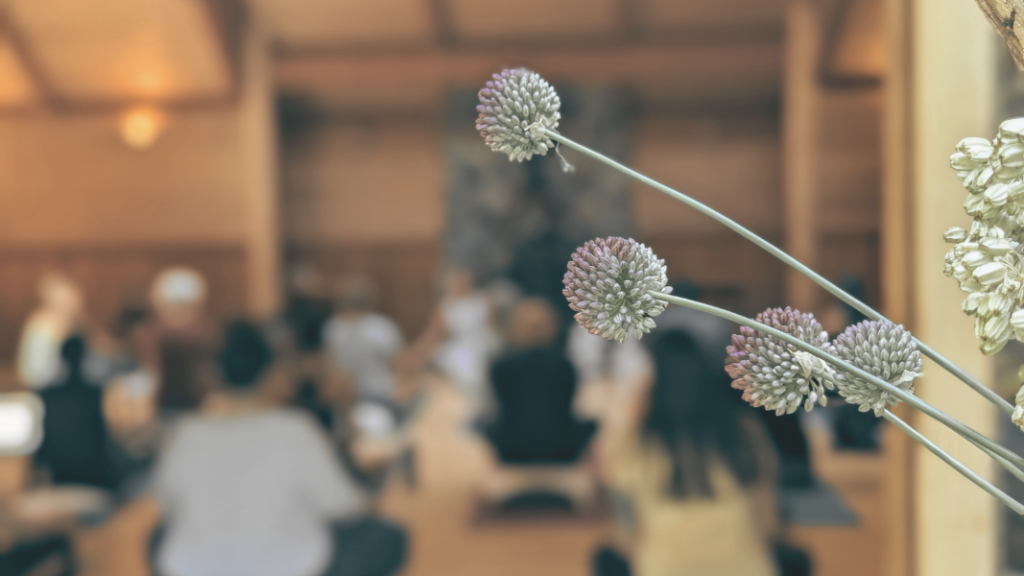Mindful Self-Compassion
With Megan Prager and Martin Thomson-Jones, PhD
June 13 - 18, 2025
Application is required before registering. You may apply here.
This 5-day residential program is an intensive form of the internationally recognized, eight-session Mindful Self-Compassion (MSC) training developed by Christopher Germer and Kristin Neff. It is open to laypeople and professionals alike. Participants will learn to: understand the science of self-compassion, practice self-compassion in daily life, motivate themselves with kindness rather than criticism, meet difficult emotions with greater ease, transform challenging relationships, and manage caregiver fatigue.
This program fulfills the prerequisite for MSC teacher training.
Detailed Information
I have been given a window into a different way of perceiving myself, a kinder, more tender self-perception. And for that I will forever be grateful.– Tuval, Past participant
Mindful Self-Compassion (MSC) is an intensive training retreat version of an empirically-supported 8-week program designed to cultivate the skill of self-compassion. Based on groundbreaking research by Kristin Neff and integrated with the clinical perspective of Christopher Germer, MSC teaches core principles and practices that enable participants to respond to difficult emotions with kindness and understanding.
The three key components of self-compassion are self-kindness, a sense of common humanity, and balanced, mindful awareness. Kindness opens our hearts to suffering, so we can give ourselves what we need. Common humanity opens us to others so that we know we aren’t alone. Mindfulness opens us to the present moment, so we can accept our experience with greater ease. Together they comprise a state of warm, connected, presence during difficult moments in our lives.
Self-compassion can be learned by anyone, even those who didn’t receive enough affection in childhood or who feel uncomfortable when they are good to themselves. It’s a courageous attitude that stands up to harm, including the harm that we inflict on ourselves through self-criticism, self-denial, or self-absorption. Self-compassion provides emotional strength and resilience, allowing us to admit our shortcomings, forgive ourselves, motivate ourselves with kindness, care for others, and be fully human.
Rapidly expanding research clearly demonstrates that self-compassion is related to greater emotional wellbeing, lower anxiety and depression, maintenance of healthy habits such as diet and exercise, and more satisfying personal relationships.
Objectives
At the completion of this activity, participants should be able to:
- describe the theory and research supporting mindful self-compassion
- motivate themselves with encouragement rather than self-criticism
- relate to difficult emotions with greater moment-to-moment acceptance
- respond to feelings of failure or inadequacy with self-kindness
- begin to transform difficult relationships, old and new, through self-validation
- practice the art of savoring and self-appreciation
- integrate core mindfulness and self-compassion exercises into daily life
Audience
This program is designed for members of the general public, as well as for professionals who wish to integrate self-compassion into their work. Participating in an MSC program satisfies a prerequisite for becoming an MSC program teacher. Meditation experience is not necessary to participate in this 5-day MSC program for professionals. All are welcome!
Training
Program activities include meditation, short talks, experiential exercises, and group discussion. This is not a silent retreat. The goal is to provide a safe and supportive environment for exploring how we typically respond when difficult emotions arise and to provide tools for becoming warm and supportive companions to ourselves. The emphasis of the program is on enhancing emotional resources and personal capacities.
For more information on self-compassion, please see The Center for Mindful Self-Compassion, Kristin Neff’s Self-Compassion.org, and ChrisGermer.com.
Participant Guidelines
The MSC program is a journey—an adventure in self-discovery and self-kindness. Compassion has the paradoxical effect of both soothing and comforting as well as opening us to emotional distress that we may have been unconsciously holding inside, often for many years. Therefore, some difficult emotions are likely to surface during the program as we grow in our capacity to embrace and heal them. The teachers are committed to providing an environment of safety, support, privacy, individual responsibility, and a common commitment to developing compassion for oneself and others.
The following reading is recommended:
- The Mindful Self-Compassion Workbook: A Proven Way to Accept Yourself, Build Inner Strength, and Thrive by Kristin Neff and Christopher Germer
- Self-Compassion: The Proven Power of Being Kind to Yourself by Kristin Neff
- The Mindful Path to Self-Compassion by Chris Germer
Daily Schedule
About the Presenters

Megan Prager
Megan Prager, MA, is Co-Founder of Mindful Labs and Compassion Programs Director at UC San Diego Center for Mindfulness. Megan is a Certified Mindfulness Based Stress Reduction Instructor (MBSR), a Certified Mindful Self-Compassion Instructor (MSC), a Certified Compassion Cultivation Instructor (CCT), a Compassion for Couples Instructor (CFC), and an Adjunct Faculty member at San Diego State University. […]
Learn more about Megan Prager
Martin Thomson-Jones, PhD
Martin Thomson-Jones, PhD, is a Certified Teacher of Mindful Self-Compassion (MSC). He first encountered loving-kindness meditation, one of the core elements of MSC, through Mindfulness-Based Stress Reduction (MBSR) in 2010, and found his way to Kristin Neff’s and Christopher Germer’s work from there. He took MSC from Chris and Kristin as a five-day intensive at Esalen, […]
Learn more about Martin Thomson-Jones, PhDCategories : Cortes Island, June, Mind & Body, Mindfulness, Wisdom Teachings

